Skool vs Patreon: Community Platform vs Creator Membership (2025)

When it comes to monetizing your content and building a thriving community, the choice of platform can make all the difference. Two popular options that creators often consider are Skool and Patreon. Each platform offers unique features and benefits tailored to different creator needs. Understanding these differences is essential to making an informed decision that aligns with your content goals and audience engagement strategy.
In this comprehensive guide, inspired by insights from content creator George Vlasyev, we will explore the key aspects of Skool and Patreon. We’ll break down how each platform works, their strengths, and which type of creators they best serve. Whether you’re a teacher, artist, podcaster, or any kind of content creator, this detailed comparison will help you decide which platform suits your needs best.
Table of Contents
- Step 1: Understand Skool’s Core Philosophy – Interactive Learning
- Step 2: Explore Patreon’s Subscription Model for Consistent Support
- Step 3: Customize Your Subscriptions with Skool’s Specialized Clubs
- Step 4: Leverage Skool’s Seamless Social Media Integration
- Step 5: Understand How Education Meets Monetization on Skool
- Step 6: Utilize Direct Transactions and Tutorials on Skool
- Step 7: Compare Use Cases — Which Platform Fits Your Needs?
- Step 8: Maximize Your Monetization Strategy
- Frequently Asked Questions (FAQ)
- Conclusion
Step 1: Understand Skool’s Core Philosophy – Interactive Learning
Skool is not just another membership site; it’s designed with interactive learning at its core. Unlike platforms that simply provide access to content, Skool aims to build a vibrant learning community where creators and members engage deeply.
On Skool, creators can host live workshops, conduct one-on-one sessions, and sell exclusive educational content. This makes it a perfect fit for experts who want to share knowledge in a structured, interactive way. Whether you specialize in coding, cooking, fitness, or any teachable skill, Skool transforms the traditional content consumption experience into a dynamic educational journey.
This direct engagement with your audience fosters a closer relationship, helping you build trust and loyalty. Monetizing your expertise becomes more than just selling content—it becomes about creating value through teaching and community interaction.
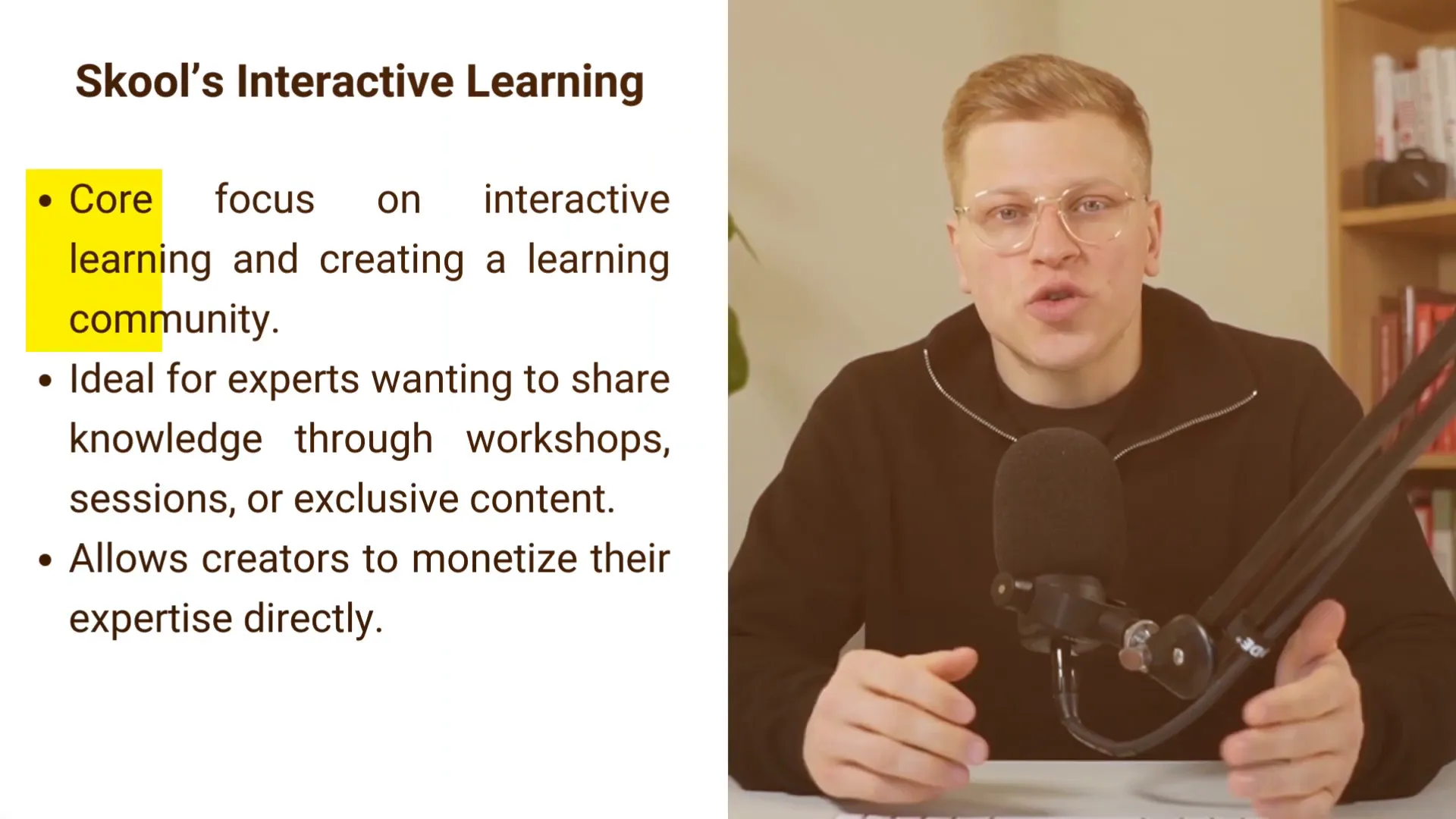
Skool’s approach is especially lucrative for creators who thrive on teaching skills that benefit from real-time interaction and feedback. From fitness coaches offering personalized sessions to digital marketers sharing strategies, Skool empowers creators to monetize their expertise effectively.
Key Features of Skool for Interactive Learning
- Live workshops and real-time sessions
- One-on-one coaching opportunities
- Exclusive educational content sales
- Community-building tools for engagement
- Dynamic learning environment beyond passive memberships
Step 2: Explore Patreon’s Subscription Model for Consistent Support
In contrast to Skool’s educational focus, Patreon centers on a subscription-based financial support model. It allows creators to receive consistent monthly funding from their fans or patrons in exchange for exclusive perks.
Patreon is ideal for creators who produce a steady stream of content such as videos, podcasts, artworks, or writings. If your goal is to build a reliable income by offering your audience ongoing access to your creations, Patreon’s tiered membership structure can help you achieve that.
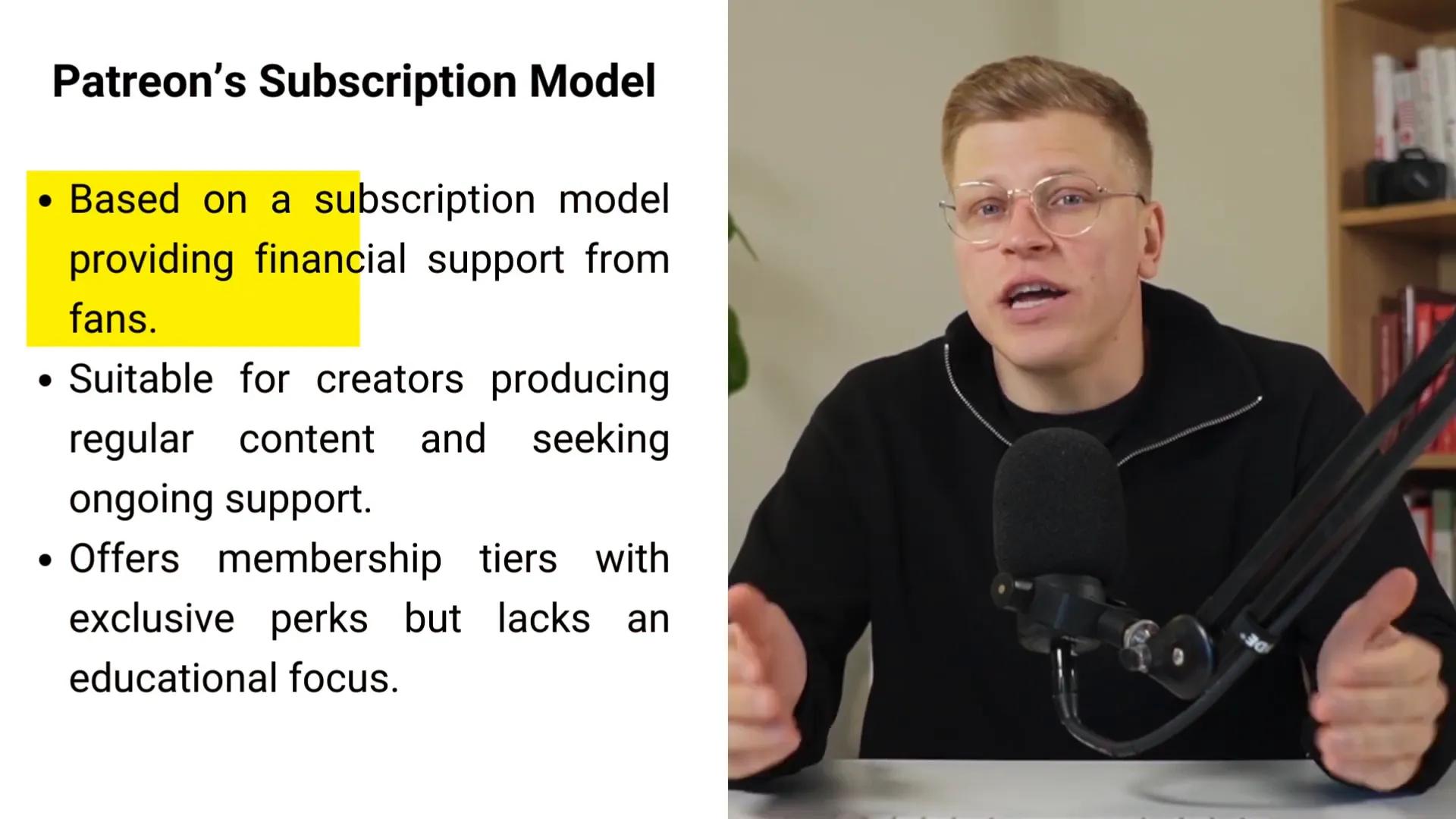
With Patreon, you can create multiple membership levels, each providing different rewards like early access to content, member-only posts, or special merchandise. This flexibility allows you to cater to various audience segments and reward your most loyal supporters.
However, Patreon does not specifically cater to interactive learning or educational content. Its primary focus is on financial support rather than creating a learning community, making it less suitable for creators whose main goal is to teach or provide educational value.
Key Features of Patreon’s Subscription Model
- Monthly recurring financial support
- Multiple tiered membership levels
- Exclusive perks for patrons such as early content access and merchandise
- Broad appeal across many types of creators
- Focus on supporting creators financially regardless of content type
Step 3: Customize Your Subscriptions with Skool’s Specialized Clubs
One of Skool’s standout features is its ability to create specialized subscription clubs tailored to different audience segments. These clubs allow creators to offer exclusive content, behind-the-scenes access, or VIP perks that cater to the unique interests of various subscriber groups.
This high level of customization supports a diverse revenue model and helps foster a sense of belonging within your community. By valuing each subscriber’s uniqueness, you can deepen engagement and offer more personalized experiences.
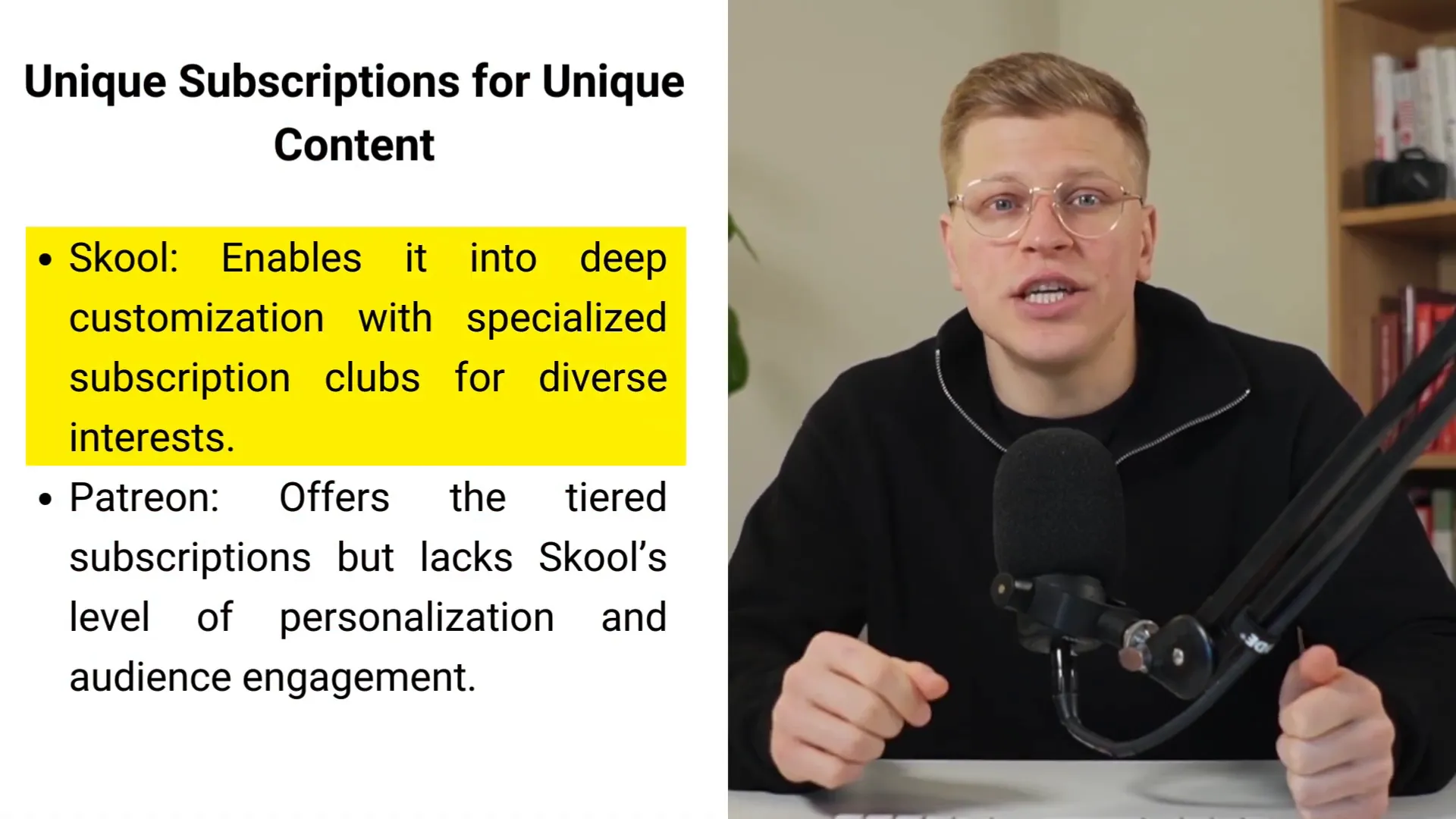
While Patreon also offers tiered memberships, it lacks the same degree of flexibility and specificity. Patreon’s tiers often provide perks that are more general, whereas Skool’s clubs enable a more targeted, personal connection with subscribers, enhancing the value for each group.
Benefits of Skool’s Subscription Clubs
- Tailored content for different audience segments
- Exclusive behind-the-scenes and VIP perks
- Supports diverse monetization strategies
- Fosters a stronger sense of community and belonging
Step 4: Leverage Skool’s Seamless Social Media Integration
For creators who actively use social media platforms like TikTok, Instagram, Twitch, and others, Skool offers a powerful advantage through seamless integration. You can connect your educational content and subscription clubs directly with your social media profiles, consolidating all monetization avenues into a single link.
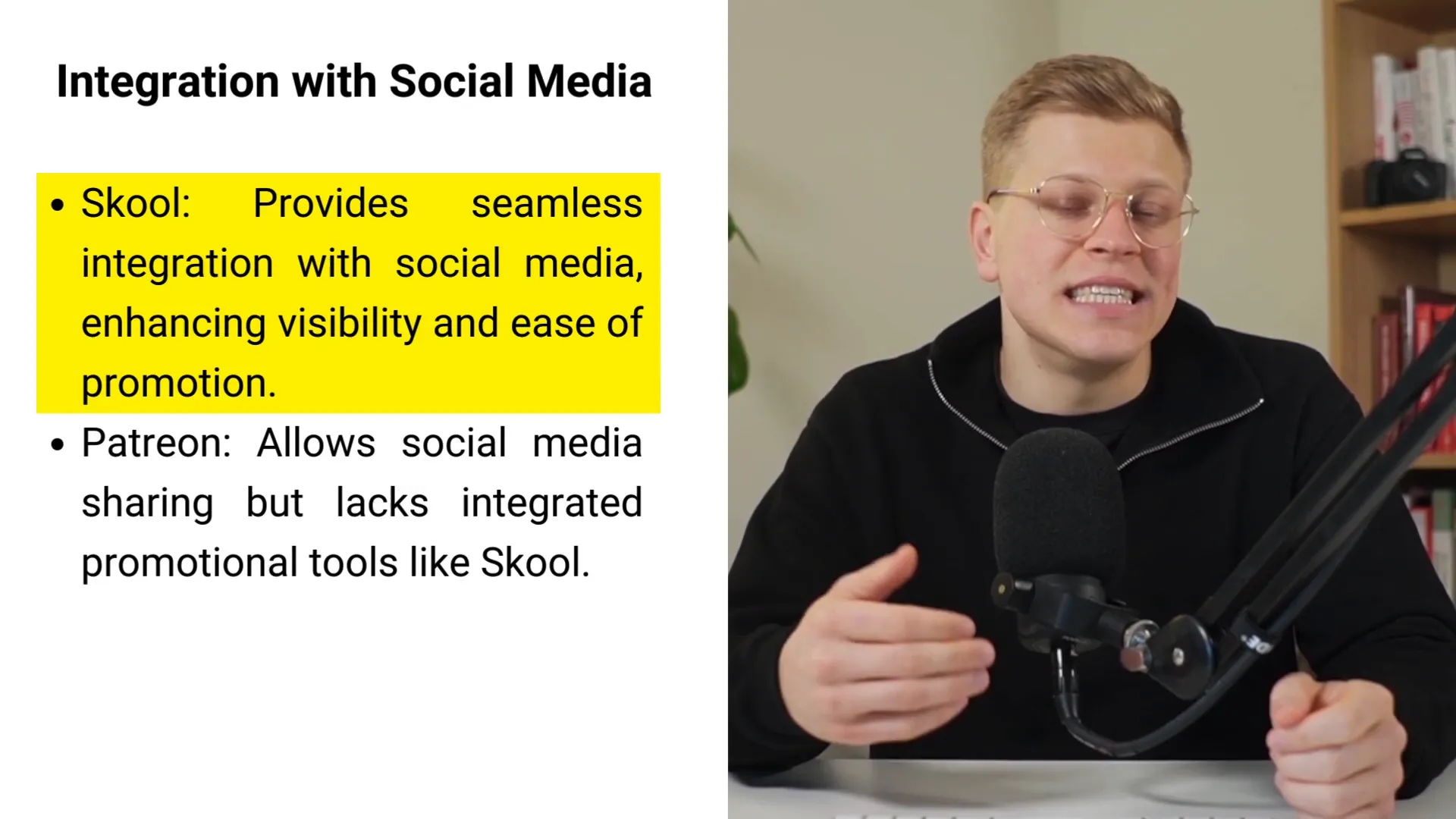
This streamlined integration simplifies promotion and enhances your visibility across channels. By having one link that showcases all your offerings, you make it easier for your followers to discover and join your community or subscription clubs.
Patreon, while widely used by creators, does not provide the same level of integration. Sharing your Patreon page on social media is possible but less streamlined, potentially limiting how easily you can promote your memberships across various platforms.
Why Skool’s Social Media Integration Matters
- Consolidates monetization links into one easy-to-share URL
- Enhances cross-platform visibility and reach
- Facilitates promotion of educational content and clubs
- Supports creators who rely heavily on social media for audience building
Step 5: Understand How Education Meets Monetization on Skool
Skool uniquely positions itself at the intersection of education and monetization. It is specifically designed for creators who want to turn their expertise into a sustainable revenue stream through teaching.
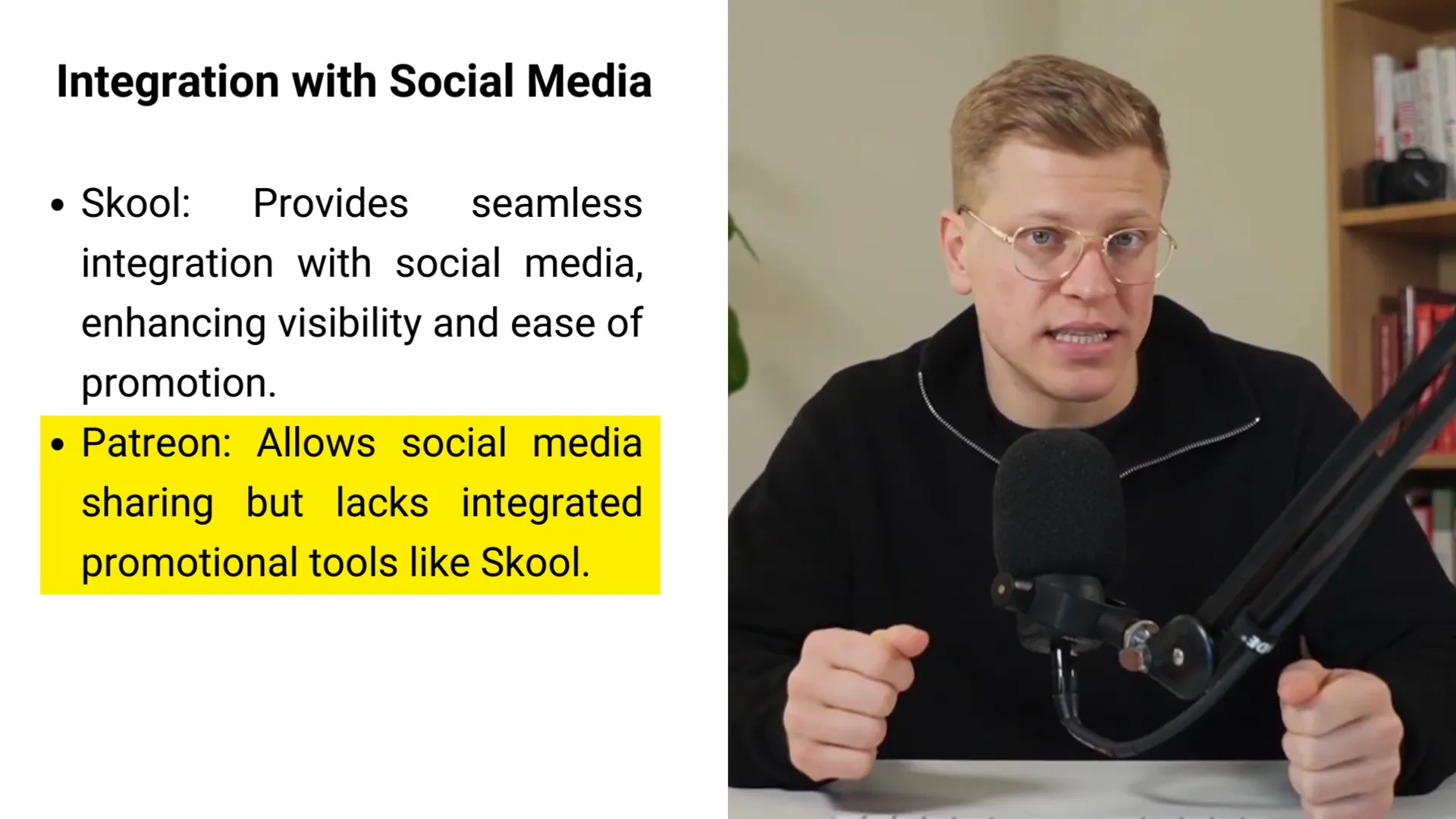
The platform’s educational aspect is not limited to traditional academic subjects. It extends to any area of expertise—from digital marketing strategies to fitness routines—where creators can provide valuable knowledge and skills.
Patreon supports a broad range of creators but does not focus specifically on educational content. Its model emphasizes financial support regardless of content type, making it versatile but less targeted for creators whose primary strategy involves teaching or instructional material.
How Skool Empowers Educational Creators
- Direct pathway to monetize teaching and expertise
- Supports diverse educational content areas
- Encourages active learning and engagement
- Builds communities around shared learning goals
Step 6: Utilize Direct Transactions and Tutorials on Skool
One of Skool’s key strengths is its ability to facilitate direct transactions for educational content. Creators can sell tutorials, workshops, and personalized coaching sessions directly on the platform.
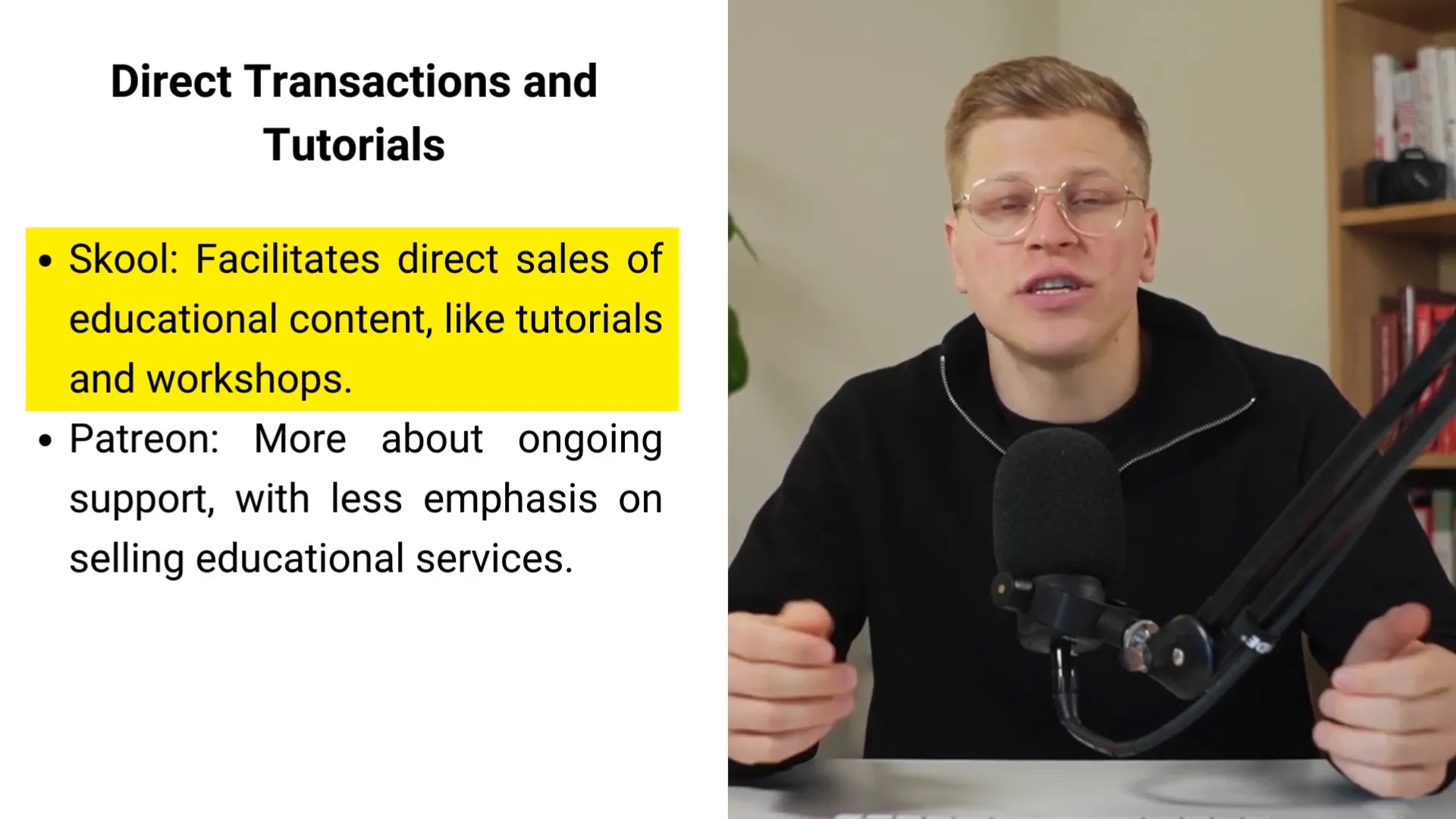
This transactional model is especially beneficial for creators who thrive on personalized interaction, such as coaching or in-depth tutorials. It simplifies the monetization process, allowing you to earn directly from your expertise without relying solely on recurring subscriptions.
Patreon enables financial support from patrons but is more oriented towards ongoing support rather than individual sales of specific services or educational content. While you can offer exclusive tutorials or workshops as perks, Patreon’s primary function remains facilitating steady income rather than transactional sales.
Advantages of Skool’s Transactional Model
- Monetize individual tutorials and workshops
- Offer personalized coaching sessions
- Simplify payment and delivery on one platform
- Enhance value through direct engagement
Step 7: Compare Use Cases — Which Platform Fits Your Needs?
Both Skool and Patreon are powerful tools for content creators, but they cater to different needs and content strategies. Choosing the right platform depends on your specific goals, audience engagement preferences, and the nature of your content.
When to Choose Skool
- You prioritize interactive learning and community building
- Your content is educational or skill-based
- You want to offer live workshops and personalized sessions
- You rely heavily on social media integration for promotion
- You want to customize subscription clubs for niche audience segments
When to Choose Patreon
- You create consistent, ongoing content like videos, podcasts, or art
- You want a straightforward subscription model for steady income
- Your audience enjoys exclusive perks but not necessarily interactive learning
- You seek a broad platform with a large existing creator community
- You prefer simple tiered memberships without complex customization
Step 8: Maximize Your Monetization Strategy
Deciding between Skool and Patreon ultimately hinges on how you want to engage with your audience and monetize your content. Both platforms offer unique advantages:
- Skool is ideal for creators who are educators at heart, focused on delivering value through interactive learning and direct engagement.
- Patreon suits creators who want a broad, subscription-based community that supports their ongoing creative output.
Consider your content type, audience preferences, and how much interaction you want with your subscribers. If your goal is to build a tight-knit learning community and monetize your expertise through education, Skool may be the better choice. If you want to foster a supportive fan base with a simple subscription model, Patreon offers a versatile solution.
Frequently Asked Questions (FAQ)
Q1: Can I use both Skool and Patreon for my content?
Yes, many creators use multiple platforms to diversify their income and reach different audience segments. You can use Skool for educational courses and workshops while leveraging Patreon for ongoing fan support and exclusive perks.
Q2: Does Skool charge fees like Patreon?
Both platforms have their fee structures, so it’s important to review their pricing models to understand how they affect your earnings. Patreon typically charges a percentage of your monthly income, while Skool’s fees depend on the plan you select.
Q3: Is Skool suitable for non-educational content?
While Skool excels at educational content and interactive learning, it may be less ideal for creators who produce purely entertainment or art without an educational component. Patreon might serve such creators better.
Q4: How easy is it to migrate from Patreon to Skool or vice versa?
Migration depends on the type of content and audience you have. Both platforms require building your community on their respective systems, so it may take time to transition your supporters. Planning and clear communication with your audience are key.
Q5: What kind of creators benefit most from Skool?
Creators who specialize in teaching skills, coaching, or providing educational content—such as fitness instructors, marketers, coders, and hobbyists—will find Skool’s interactive features and monetization options especially beneficial.
Conclusion
Choosing between Skool and Patreon is a pivotal decision for content creators looking to monetize their passion and connect meaningfully with their audience. Both platforms have strengths that cater to different content strategies and creator goals.
Skool shines as a platform built around interactive learning, community engagement, and direct monetization of educational content. Its specialized subscription clubs, social media integration, and transactional capabilities make it an excellent choice for creators who teach and want to build a vibrant learning community.
Patreon, on the other hand, offers a straightforward subscription model that works well for creators producing regular content and seeking ongoing financial support from fans. Its flexibility and wide appeal make it suitable for artists, musicians, writers, and podcasters alike.
Ultimately, your decision should align with your content type, how you want to engage with your audience, and your preferred monetization method. Both Skool and Patreon empower creators to earn from their work and foster meaningful connections with their communities.
Whichever platform you choose, remember that monetizing your creativity is about delivering value and building trust. Invest time in understanding your audience, offering quality content, and leveraging the unique features of your chosen platform to maximize your success.
Ready to take the next step? Explore these platforms and see which one resonates with your vision as a creator. Monetize your passion, grow your community, and turn your expertise into a sustainable career.
Ready to Build Your Skool Community?
Start your 14-day free trial today and turn your expertise into a thriving, profitable community that members love.
Start Free Trial